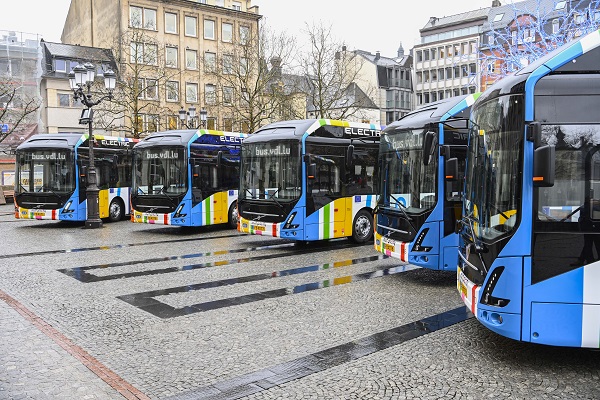 Credit: Photothèque de la Ville de Luxembourg / Charles Soubry
Credit: Photothèque de la Ville de Luxembourg / Charles Soubry
On Tuesday 15 December 2020, the new fleet of 100% electric buses of the City of Luxembourg were presented at a press point in Place Guillaume II, in the presence of Mayor Lydie Polfer and Patrick Goldschmidt, alderman responsible for mobility, Lex Bentner, Head of the City Bus Service (Service Autobus de la Ville - AVL), and Pierre Colbach, representative of the Ministry of the Economy.
In 2019, the City of Luxembourg launched a European tender for the supply of ten 12-metre-long 100% electric buses. Volvo Bus company won the contract in January 2020 and the buses were delivered in November 2020.
This development forms part of the City of Luxembourg's goal of reducing CO2 levels. One way of achieving this goal is to replace all gasoline-powered buses with electric buses between 2025 and 2030. Since the fleet of AVL and subcontractors covers approximately 13.7 million kilometres on the City's network each year from Luxembourg, a distance equivalent to circumnavigating the world once a day (Monday to Friday), this is expected to have a significant impact on the air quality in the city, especially on major traffic axes such as Boulevard Royal or Avenue de la Gare, and on the environment, particularly by a considerable reduction in toxic emissions.
Patrick Goldschmidt stated that “the City is making, on the one hand, efforts to make the capital cleaner and quieter and, on the other hand, to increase the quality of public transport for users. A big step has been taken with the recent entry into service of the tramway to the Central Station, and the same efforts will be made with regard to other public transport, in particular the AVL buses which cross the 24 districts of the capital day and night".
The ten new electric buses of the AVL network will be put into service on lines 9 and 14. Since a diesel bus needs around 40 litres of fuel per 100 kilometres, it should be possible to save around 301,000 litres of fuel per year.
As subcontracting is also present with electric buses on the two lines, this allows 100% electrification of lines 9 and 14 and further fuel savings. In total, around 440,000 litres less fuel will be consumed per year, which is equivalent to a reduction of 1,161 tonnes of CO2 over a total distance of 1.1 million kilometres that lines 9 and 14 cover each year.
The electrification of the Luxembourg City bus network meets the criteria of the European Regional Development Fund programme, and following collaboration with the Ministry of the Economy, which is responsible for the management of the fund in Luxembourg, the City of Luxembourg obtained co-financing of some €3 million on the total investment for the acquisition of ten new electric buses.
The new 12-metre-long buses can accommodate up to 86 passengers. The buses are equipped with a 264 kWh battery for a range of around 180 to 200 km. Thanks to their flexibility with regard to recharging, the buses can be charged quickly, particularly by the OppCharge terminals such as those at the Cents-Waassertuerm stop, or at the depot using the Combo2 sockets. The new CE 7900 E buses also feature an air conditioning and heating system.








